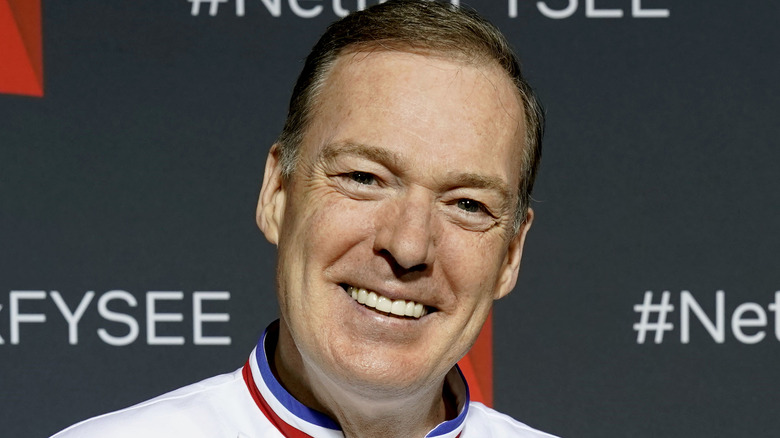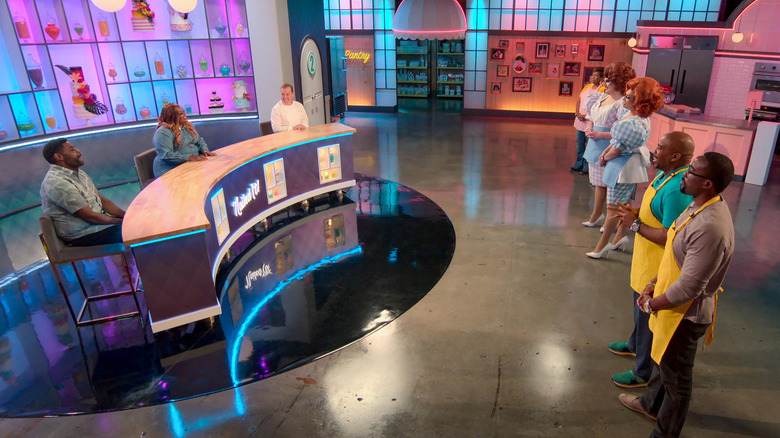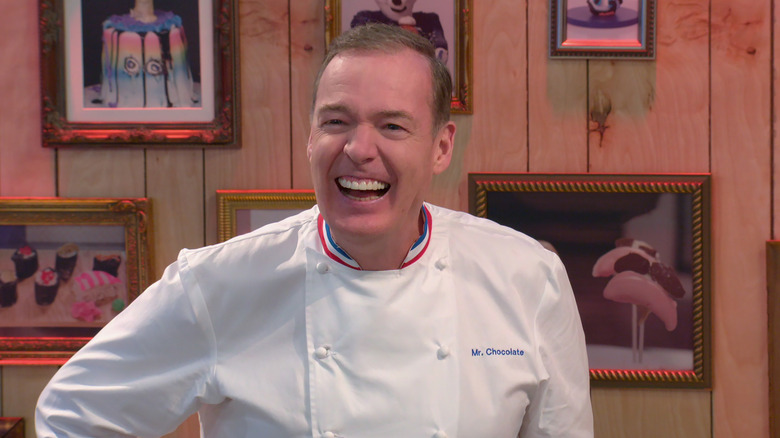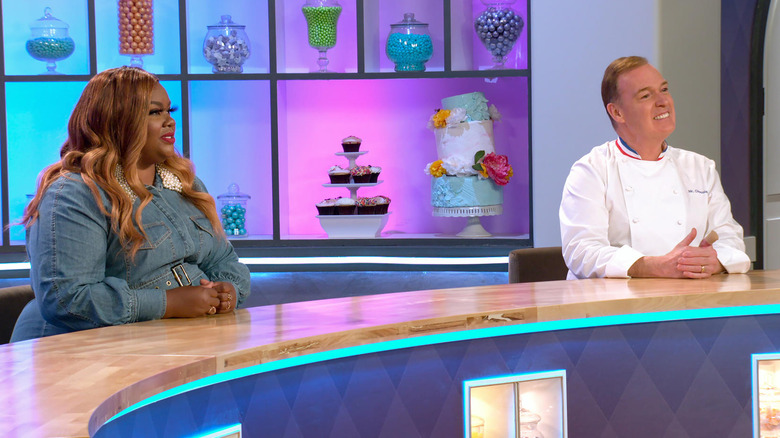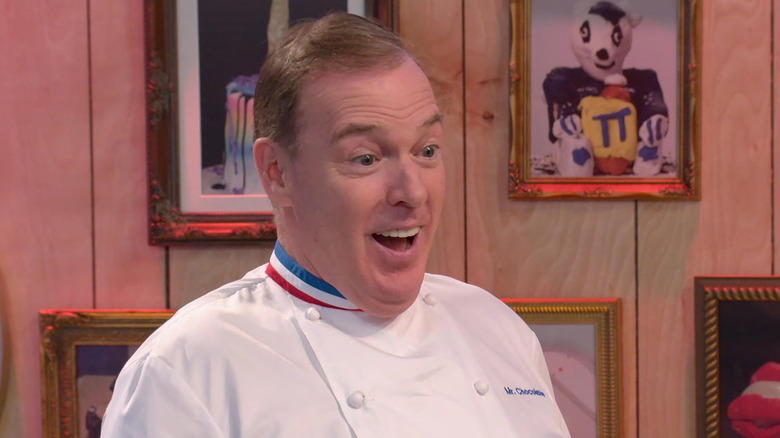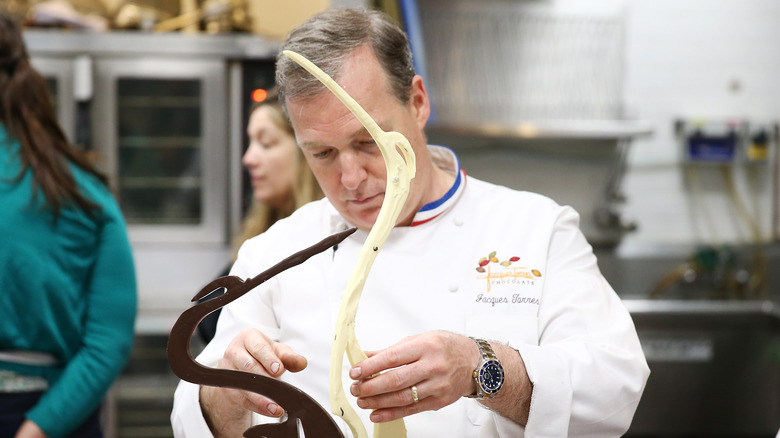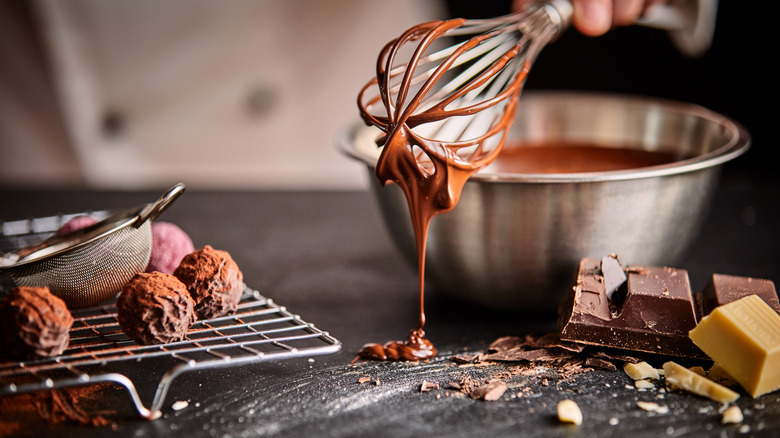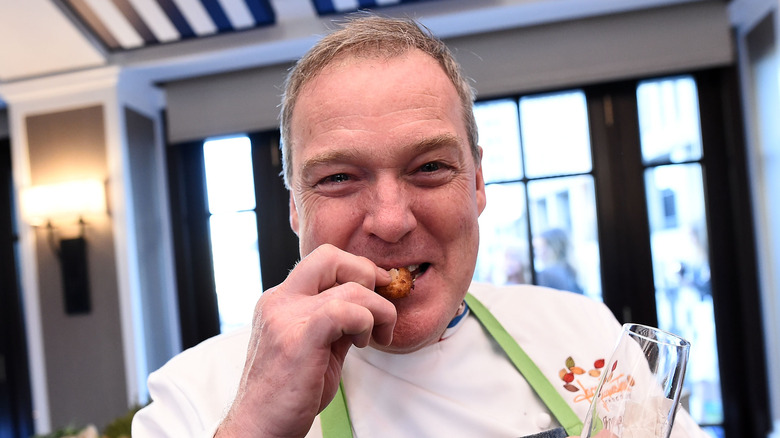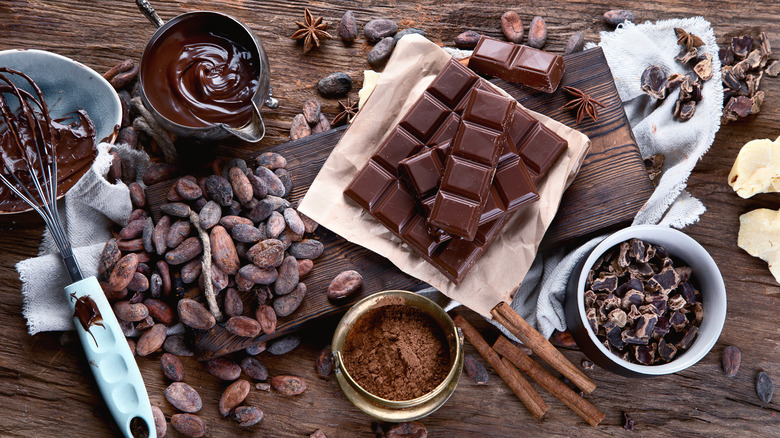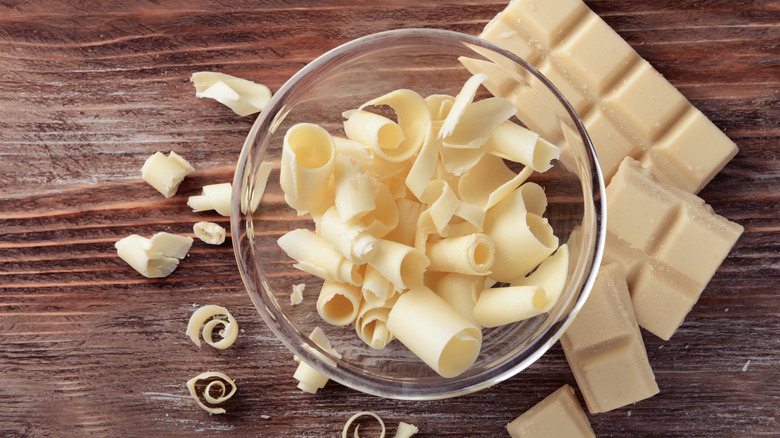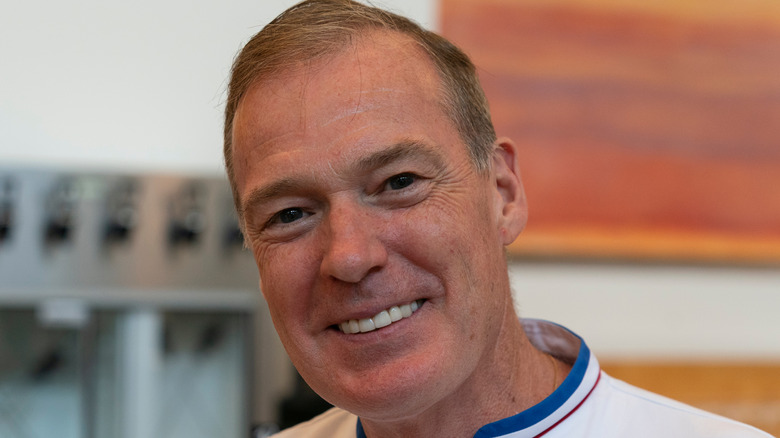Jacques Torres Talks Nailed It!, His Best Baking Advice, And What We All Need To Know About Chocolate - Exclusive Interview
Chocolate is for all of us. Enjoyed in its various forms by people of all ages and cultures, if there is a universal love language that exists, it has to be chocolate. And perhaps no one can speak that language better than Jacques Torres.
The world-renowned French pastry chef is fondly known as Mr. Chocolate. And when he's not concocting confectionery creations at his chocolate factory in New York City, he's guiding amateur bakers as the presiding judge on Netflix's Nailed It!. The popular baking show features non-professional bakers attempting to recreate dessert masterpieces dreamed up by the pros. It usually goes about as well as you'd imagine, but the laughs along the way make it a must-watch for foodies, or anyone with a sweet tooth.
Mashed caught up with Chef Torres to discuss the newest season of Nailed It!, which features a new twist this time around. Mr. Chocolate also shared some inside tips for anyone trying to whip up their own baked treats at home. Torres also dished on his chocolate cravings, and answered some of our most pressing chocolate questions (can it actually cure my cold?).
Jacques Torres on the newest season of Nailed It!
What can viewers expect from season five of Nailed It!?
We did something a little bit new ... we taped with two bakers. So you would expect better work, better cakes, better finish, but it's still a catastrophe. It's still very funny. It's still people having fun in the kitchen and goofing around and doing some crazy stuff and everybody's laughing.
So that's what to expect is more laughs, more fails, more bad cakes, and don't expect magical things happening because there are two bakers in the kitchen. Uh-uh (negative) that doesn't exist.
Is it going to make it easier working with a second person? Or is it just creating double the mess technically?
That's double the mess, double the problems. But it's funny because of the interaction with people — they know each other, of course. So we have family members working together, couples. So that brings another dimension, I think, to the show, because of the relationships between people. So yeah, that's what you can expect to see — on top of the fails — the relationships, and sometimes the friction of people working together, which is quite interesting.
Can you share some of the best or worst maybe creations that you've seen?
I cannot really describe creations because the show is coming out. But we really try to make it possible for the bakers to be able to do it in their timeframe. So we try as professionals to do it in the same timeframe. And then, of course, the non-professionals after that have problems.
So we try hard to make it possible for them. And sometimes you're going to say, wow, okay yeah. It's possible, I can do it. And then you realize, maybe it's not that easy. So that's the story with this new season. We really try to not make it easier, but make it reasonable, let's say that.
Jacques Torres loves the message behind Nailed It!
The interesting thing about the show, from an audience viewpoint, is that they never actually nail it ... that's sort of the appeal of the show, right? That's the whole draw.
You're right. And I think also that the message behind the show is — you know how teenagers have to have a certain look, everything has to be a certain way ... the generation of perfectionists. The show actually goes away from that. And [Nailed It!] shows you that things don't have to be perfect. Things don't have to be the way that we ask them to be. And it can be fun and you can still be good and they can have a good time, even if the result is not there.
And I love this message behind the show where we say it's okay. It's okay if things are not perfect. That's really something that I think we try to tell the audience and to tell the people, the bakers. And we really try to tell them everything is okay. So I love that side of the show.
Jaques Torres on judging Nailed It! and working with Nicole Byer
What is the best part of filming for you?
I'm always amazed how courageous those bakers are to expose themselves. They are goofy. They're going to do some crazy stuff. They're going to fail, but you know what? Millions of people are going to see it and they still have a good time. And I find that very courageous. It's not easy to go in front of a camera, in front of an audience and do that. And they do it.
And we shot during the pandemic so that was not the easiest thing. So we have to social distance a little bit more. We have to be a little bit more careful for everything. And still, the bakers were there and they did it. So to me, that's amazing. Big congratulations to those bakers who do those things. That's great.
Can you talk a little bit about your dynamic working with Nicole Byer?
I have to say that I didn't know Nicole before. I met her when I came to the show. And we are so opposite. I mean, she's a comedian, I'm a chef. I know nothing about comedy. She knows pretty much nothing about cooking. But somehow we find ways to be friends. We find ways to laugh together. We find ways to do the show together and we have a good time.
Nicole is so funny. She make jokes ... I mean, you see not even a tenth of who she is. She's great. I love to work with Nicole. And I have to say that the day goes a lot faster because she's there. So yes it's work, yes it's stressful, yes, the days are long, but because Nicole is here, it's a lot of fun. So I love to work with Nicole. You know she's a treasure. She's really great.
And I feel like you need that energy when you're shooting 14 hour days under that intense pressure.
Oh my god, yes.
Jacques Torres dishes on the biggest mistakes he sees on Nailed It!
I know you can't say too much about what we're going to see in the upcoming season, but looking back on the last four that you've done, were there particular moments or creations that were just so insane or memorable for you that you can share?
I mean, look, pretty much every show you will see some insane thing. What they do is just funny. You're going to see a lot of hot cake. They don't leave them in the freezer long enough. And then they're going to put buttercream on it. They're going to put butter on top of something hot. So what do you expect? Things collapse. The buttercream sinks into the cake. The cake becomes very heavy ... when you put buttercream on top of a hot cake, it becomes a hot mess. And then they're going to give us that to eat. So you can imagine, you can see our faces all the time.
It's quite funny because, to me, as a chef being in my seat and looking at them, I can see right away when they start messing up ... Say 'oh my god what are they doing again?' And here we go. So you're going to see a lot of those wet cakes, wet buttercream, fondant that is too thick.
And then another thing that they do a lot is they don't save enough time for the creation. So they start slow. And then they realize that they have 15 minutes left and they're just throwing things together — color, cakes, buttercream, fondant, whatever they find in the pantry. They put everything together, and then you nailed it. And it's like oh my god you did anything except nailing it.
Most of the time, would you say that things end up tasting better than they look?
We give them a cake, most of the time, not all the time. But we give them some cake ... you call that cake mix. So they just have to add the eggs and add the fat. And somehow with those cake mixes, the cakes don't come out very bad. Except one time someone put salt instead of sugar. So you can imagine, yes, then it tasted really bad.
And then the buttercream, we give them the recipe. So if they somehow follow the recipe a little bit, it's going to be a sweet buttercream. Sometimes it's heavy, sometimes they put too much flavoring. They never measure things. So flavoring is something that a couple of extra drops can make it almost inedible. And when you see how they measure things, oh my god, they don't really care. They just put a lot of it. So we try to adapt. And then for the next two days, we have this flavor in our mouth.
So you're going to see few of those mistakes too with flavor. But flavor, it's very difficult to translate that on television, except when you see our face. So it's a little bit more difficult. But the fail and the funny looking cakes. An eye here, an eye here ... And that you're going to see that a lot.
Mr. Chocolate shares advice for bakers at home
A lot of people baking at home are watching this show for inspiration or for laughs. Throughout the episodes, we hear you give advice and guidance on camera of what they're doing wrong, what they could have done better. Do you have any go-to baking tips or secret ingredients that you can share with our readers who are baking at home?
When you bake, make a plan. So spend a couple of minutes thinking okay, what is my first step, second step, third step. You need a plan. For anything that you do, you need the plan. And you have to think okay, now the cake is going to be in the oven. When the cake is in the oven, what can I do? Okay. I'm going to do those decorations. And then when the cake comes out of the oven, I put it in a blast freezer. That's another six minutes, eight minutes. Okay, so what am I going to do? So you have to have a roadmap before you start.
I think that most of the time one of the problems is [bakers] don't think about that. They just think about, okay, let's do that. Oh, okay let's do that. Oh, what about doing that. So to the reader ... make a roadmap and try to follow the steps. And don't waste time during the time that the cake is baking. You can do the decoration during the time that the cake is cooling down. You can maybe whip your buttercream or do something else. And then you can assemble things.
Remember that when you glaze a cake, a lot of time, you should glaze it two times. So you put on the buttercream one time. And by doing it a second time, it becomes very nice and very smooth. So do it two times. Buttercream most of the time is too heavy. Why? Because [bakers] don't aerate the buttercream in the mixer long enough. So do that. Aerate your buttercream on the mixer long enough and the buttercream is going to become very light and very pleasant and not like a brick inside the cake.
So the readers have to think about those little things, organization, clean less, and I always say cook with wine. What I mean is have a bottle of wine open somewhere and have a glass of wine from time to time. That's what cook with wine means. You know?
Love it.
So what I mean is, look, have fun. You're making a cake. Anyone can buy a cake. Okay? Anyone can go to the baker and buy a cake. Now you're making it, at least have fun doing it. If it doesn't look perfect, it's okay. It's not the end of the world. It's a cake. It's fine.
And maybe do it with others ... I love to work with my son and my daughter in the kitchen. They eat more candy than they help me, but I have fun with them. And it's a family thing. I hope they will remember that they and dad bake in the kitchen. It's fun. It's something that I hope they will remember.
Jacques Torres on our chocolate mistakes
I want to ask you about chocolate specifically, because that is its own sort of difficult beast to work with. I think, especially for those of us who don't know what we're doing. What are some of the biggest mistakes that you see people making when trying to bake or work with chocolate?
Using the wrong chocolates for the wrong things. I always look at chocolate chip cookies, something very easy, something that everybody's doing. The chips they use in chocolate chip cookies don't melt. They have the same shape after coming out of the oven then before they go in the oven. And if chocolate doesn't melt, something is wrong with that chocolate. Don't use it. I mean, it's funny to me that chocolate can not melt at 350 degrees Fahrenheit in the oven for 20 minutes. It's unbelievable. But it doesn't.
So we make cookies with the same chocolate that we use to make the little candy. That chocolate melts. When we put that into the dough, it just melts into the dough. When you eat it, it melts into your mouth. It's a completely different experience than chocolate that doesn't melt.
A lot of times, people [also] try to use that type of chocolate to make a chocolate sauce. That chocolate doesn't melt. So you cannot call it sauce. There is not enough cocoa butter in it. You need a high-quality chocolate that melts, that has enough cocoa butter.
Jacques Torres dishes on his chocolate cravings
After such a long career in chocolate, do you even get chocolate cravings anymore? Is that a thing?
Oh yes. Actually, I do eat chocolate. I eat chocolates every day.
I need to show you what's going on. We are the factory here. So first, this is in front of my desk is a picture of a cacao farm. And you can see the cacao pod over there. So it's cool. But let me show you, you're going to see it's very funny. This is Easter time so of course we have a lot of the rabbits and the chicken and all those things.
Oh my goodness.
And those are really big. I mean, look at the size of my hand, look at the size of those rabbits. It's crazy, no?
That's all chocolate?
That's all chocolate. Everything is chocolate.
Incredible.
Look at those rabbits here. Those are called the running rabbits. They are just, they're just beautiful. Those are just beautiful. And so very English ... Look at the eggs ... Look at the chickens ... It's rack after racks.
Oh, I could eat all of them.
So I stepped in and made you hungry here ... So yes, I still enjoy chocolate. I still enjoy eating the chocolates. And I think it's part of who we are and what we do. Thank god I still enjoy that.
So when a craving hits, what's your go-to recipe? What's your favorite thing to make?
So it's interesting because I like dark chocolate after dinner, before I go to bed. Or if I want something a little bit sweet, I will have dark chocolate after dinner. If it's the afternoon like now, I will have a piece of milk chocolate with nuts. Or maybe mint chocolates or dark chocolate with marshmallows. Something a little bit sweeter. I like something a little bit sweeter during the day. Certainly, because that's going to carry me to the evening, to dinner energy-wise. And then in the evening, I will cut the sugar and go for something more flavorful.
Jaques Torres shares what we should all know and appreciate when it comes to chocolate
Where does your passion for chocolate come from? What is so amazing about chocolate that we need to understand?
I am a pastry chef by trade. And when you're a pastry chef, you learn to work with chocolates. It's one of the mediums that you're going to use. We work with sugar, we work with ice, we work with different mediums. And chocolate has always been something very interesting to me ... I realized that you can do so much with chocolates. You can do drinks, you can do cakes, you can do Petit Gâteau, you can do a little chocolates, you can do centerpieces, you can do so many things.
And one of the other things is, chocolate is really loved by pretty much everyone, every gender, every culture, every age. So I arrived at the conclusion that let's work with chocolate because everybody loves it. It will be an easy thing to sell if I open a business with chocolates. So that's what I did. I opened a business with chocolates.
And we do chocolate in all its forms and shapes and tastes. So that's why you see those huge rabbits and those little eggs. And then we do the bonbons and then we do the drinks. And then, I mean, we do so many things with chocolates. It's so many stations here. So much machinery that we do so many things [with]. So my guess is versatility and commonly love is what comes to my mind when you say "why chocolates?"
Are there any myths or sort of misconceptions that we have about chocolate that you want to set the record straight about?
Chocolate can cure a common cold. Chocolate can cure any type of disease. Yes. You have to tell people that. That's not true, but I hope.
But you know, chocolate was, at one point, the currency and that's true. The Mayans used to use the cacao beans as a currency. They used to drink a hot chocolate mixture that had no sugar at the time, before they got married or before they went to war.
And the chocolate that we know under each form today is less than a hundred years old. We find traces of chocolates in pottery going back 5,000 years. So for 5,000 years, people have been using the cacao pod and the cacao beans. But less than a hundred years ago was the creation of chocolates. Chocolate became "chocolate" when machinery started to be used. So it was in the 1900s. It was not before that.
So it's not that old if you think about it. That's one of the parts of the history that people don't know. Of course, chocolate comes from the Mayan history. And at the time of Christopher Columbus, people brought it back to Spain and then it became chocolates after that.
Jacques Torres gives his take on white chocolate
There's a bit of a debate as to whether or not white chocolate is really chocolate. What is your opinion on this?
We call it white chocolate because the first ingredient in white chocolates is the cacao butter, the fat coming from the cacao beans. And 50 percent of the cacao bean is cocoa butter. So if you think about it, the most important ingredient is cocoa butter, and this is 50 percent of the cacao beans, of the cacao plant. And then the only thing that's added is milk powder, that you will find in milk chocolates, sugar, that you will find in pretty much all the chocolates, lecithin, and vanilla.
So that's why. Because it's real cocoa butter, that's why we call it white chocolate. And when that cocoa butter is replaced by another fat, then it cannot be called white chocolate. It will be called white compound or white whatever, but it's not called white chocolate because the fat doesn't come from the cacao plant. But in the instance of white chocolate, the fat comes from the cacao plant. That's why we call it white chocolate.
And it's sweet and it's milky and kids love it. Then people who have a little bit less of a sweet tooth love milk chocolates. And then people who have less of a sweet tooth are going to love dark chocolate. And the higher the cocoa content, the higher the percentage will be. So sometimes you will see 50 percent, 60 percent, 70 percent, 80 percent cocoa contents, that's how much cocoa you have in the dark chocolate.
Jacques Torres's final thought for bakers? Always go with the best ingredients
For all of our home bakers out there who are falling in love with baking, falling in love with chocolate, and they want to start baking with it, what should they start with?
Something that they have fun with. I always explain when I do pastry, if you take strawberries in February, and you make a strawberry pie, strawberry tart, it's not going to be that good because the strawberries are not the best at that time of the year. It's very hard to find a beautiful product in the middle of the winter.
If you don't put the best ingredients into a recipe, you might be deceived when you are done. It's not you. I cannot make a good strawberry tart or strawberry pie with bad strawberry. I cannot change that.
If someone starts to bake or to play with chocolates, use something good. Use something good because whatever you're going to do, at the end you're going to have something good. If you put good chocolates in the recipe, at the end, you will have good chocolate. So it's more likely that you're going to enjoy what you eat if you start with something good. Try to buy the best ingredients possible. And then you have a chance to end up with something pleasant.
You can catch Jacques Torres in the newest season of Nailed It!, available to stream now on Netflix.
